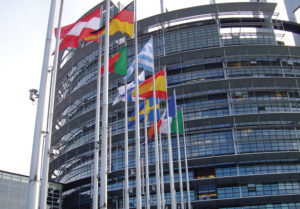Gradual divergence

 The UK Government appears to have coined the phrase ‘gradual divergence’ to indicate their desire for a smooth transition away from the EU which appeases both brexiteers and remainers. However it is likely to be met by resistance in Brussels.
The UK Government appears to have coined the phrase ‘gradual divergence’ to indicate their desire for a smooth transition away from the EU which appeases both brexiteers and remainers. However it is likely to be met by resistance in Brussels.
Theresa May’s ‘gradual divergence’ approach can be translated as: ‘having your cake and eating it’. The phrase has been coined by Cabinet members as they look towards phase two of the Brexit negotiations, appeasing all sides in the UK.
Essentially the term indicates the UK’s desire to slowly pull away from the EU following the conclusion of the transitional arrangement in 2021 rather than face a cliff-edge exit.
Although May has yet to fully outline the various sectors in which the UK will seek to align with current EU regulation and standards, it is believed that the UK is keen to form its own rules around things such as technology, robotics, artificial intelligence and data sharing. But would seek to continue wider economic relationships by maintaining the same stance in areas such as state aid and competition law.
For now, the approach will appease both those who want a complete separation from the EU, in that it is not a Norway-type regulatory alignment model, and those who fear complete separation will be economically damaging.
Cheery-picking those sectors that best suit the UK however, will be a hard sell in Brussels where the approach has always been one of uniformity. If the UK wants access to parts of the single market then it must also accept the terms that come with that access – most obviously, the EU’s four freedoms.
The UK hopes that by spelling out its ambitions in greater detail they can in some way shape the EU’s trade framework guidelines which are set to be published in March.
The idea of a bespoke deal for the UK has been quickly snubbed by the EU’s Chief Negotiator Michel Barnier. Speaking about plans mooted for the City of London to retain single market access, in all things but name, Barnier said that there was no existing instance where financial services could retain their passports to trade while outside of the single market.
Canada plus plus plus
The statement by Barnier also ended ambitious plans laid out by Brexit Secretary David Davis for a ‘Canada plus plus plus model’. Canada’s deal with the EU largely removes the vast majority of customs duties on EU exports to Canada and vice versa without payment for access to the EU. Davis said that he would like to see financial services included in such a deal.
Whether or not the EU will be flexible to the UK’s demands remains to be seen but as of now they remain resolute in their stance. Highlighted recently by Barnier’s language after receiving the backing of the EU27 ministers for directives for the next phase of negotiations.
He quickly dismissed suggestions from Davis that, during transition, the UK would not obey all EU laws and regulations, including new policies adopted after Britain’s EU voting rights are terminated on 29 March, 2019. Barnier stressed that London would be barred from implementing any new trade deals or international agreements without approval from the EU during the two-year period.
“The decisions will apply, and the UK must know these rules of the game and accept them in the first place,” he said. “As part of the transition the UK will remain bound from the obligations stemming from all existing EU international agreements, for instance for trade and aviation. This is crucial for the good functioning of the single market and the customs union.”
The UK Government appears to have coined the phrase ‘gradual divergence’ to indicate their desire for a smooth transition away from the EU which appeases both brexiteers and remainers. However it is likely to be met by resistance in Brussels.
“The decisions will apply, and the UK must know these rules of the game and accept them in the first place.”





